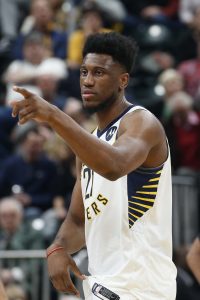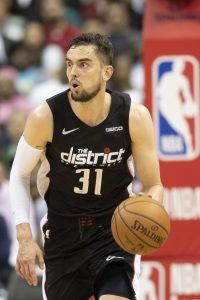Hoops Rumors is breaking down the 2019 offseason for all 30 NBA teams, revisiting the summer’s free agent signings, trades, draft picks, departures, and more. We’ll evaluate each team’s moves from the last several months and look ahead to what the 2019/20 season holds for all 30 franchises. Today, we’re focusing on the Chicago Bulls.
Signings:
- Standard contracts:

- Thaddeus Young: Three years, $40.64MM. Third year non-guaranteed. Signed using cap room.
- Tomas Satoransky: Three years, $30MM. Third year partially guaranteed ($5MM). Acquired via sign-and-trade using cap room.
- Ryan Arcidiacono: Three years, $9MM. Third-year team option. Re-signed using Early Bird rights.
- Luke Kornet: Two years, $4.5MM. Signed using room exception.
- Shaquille Harrison: One year, minimum salary. Partially guaranteed ($175K). Re-signed using minimum salary exception.
- Two-way contracts:
- Non-guaranteed camp contracts:
Trades:
- Acquired Tomas Satoransky in a sign-and-trade from the Wizards in exchange for either the Bulls’ or Grizzlies’ 2020 second-round pick (whichever is more favorable), the right to swap the Lakers’ 2022 second-round pick for either the Bulls’ or Pistons’ 2022 second-round pick (whichever is more favorable), and the Bulls’ 2023 second-round pick with protections removed.
- Note: The Wizards had acquired the Bulls’ 2023 second-round pick with 31-36 protection in a previous trade.
Draft picks:
- 1-7: Coby White — Signed to rookie contract.
- 2-38: Daniel Gafford — Signed to four-year, minimum-salary contract. Third year non-guaranteed. Fourth-year team option. Signed using cap room.
Departing players:
Other offseason news:
Salary cap situation:
- Used cap space; now over the cap.
- Carrying approximately $112.31MM in guaranteed salary.
- Hard-capped.
- $2.52MM of room exception still available ($2.25MM used on Luke Kornet).
Story of the summer:
The Bulls have been in rebuilding mode since trading Jimmy Butler to Minnesota during the 2017 offseason. Chicago won 27 games in 2017/18 and just 22 games last season, reflecting both the team’s ongoing youth movement and a struggle to keep its roster healthy.
While the Bulls aren’t yet ready to go head-to-head with the Eastern Conference’s heavyweights, they entered the 2019 offseason looking to take real steps toward contention. After all, Otto Porter is entering his seventh NBA season, Zach LaVine is entering his sixth season, and Lauri Markkanen will be in his third year. With several of their cornerstone pieces in or nearing their respective primes, the Bulls believe it’s time to win a few more games.
That goal was evident based on Chicago’s approach to free agency. After using the No. 7 overall pick to select point guard Coby White, the team wasn’t content to hand him the keys to the offense, going out and acquiring veteran point guard Tomas Satoransky in a sign-and-trade with the Wizards to add some stability to the backcourt.
The Bulls took a similar approach up front. With veteran center Robin Lopez departing in free agency, the franchise could’ve leaned on its frontcourt duo of Markkanen and Wendell Carter. While those two big men should see plenty of important minutes in 2019/20, Chicago also brought in free agent power forward Thaddeus Young, a reliable veteran who has appeared in 51 playoff contests over the course of his 12-year career.
Outside of Young, Porter (31 playoff games) and Satoransky (16), no other Bull has played in more than one postseason series, so adding vets with that sort of experience was crucial for a club with playoff aspirations.
Read more
Key offseason losses:
Wayne Selden and Antonio Blakeney saw regular minutes for the Bulls during the 2018/19 season, but their departures won’t have a huge impact on the team’s rotation. Denzel Valentine will be back to help fill minutes at shooting guard this season behind LaVine, and the club has so many points guards on its roster that I expect we’ll see them sharing the court at times, reducing the need for twos like Selden and Blakeney.
The most noticeable loss in Chicago’s locker room may be Lopez, who has been the team’s veteran leader during its rebuild over the last couple years. The 31-year-old wasn’t putting up huge numbers or playing big minutes (he averaged 9.5 PPG and 3.9 RPG in 21.7 MPG last season), but his understanding of the game and ability to do the little things made him a good mentor for the likes of Markkanen and Carter.
Key offseason additions:
The Bulls’ signing of Jabari Parker during the 2018 offseason was questionable at the time and looked worse as the season progressed. While the team was at least able to use Parker’s expiring contract to acquire Porter from the Wizards, the front office appears to have learned its lesson based on the way it approached free agency this time around.
Rather than focusing on one-dimensional contributors like Parker, the Bulls zeroed in on veterans with more versatile skill sets. Young’s combination of size and agility allows him to guard multiple positions, and he won’t hurt you on offense either — he hasn’t averaged fewer than 11 points per game since his rookie season and he knocks down the occasional three-pointer.
As for Satoransky, he got the chance to play more in Washington over the last two years with John Wall sidelined and showed off impressive efficiency, posting a .501 FG% and .422 3PT% since the start of the 2017/18 season. While his counting stats don’t jump off the page, Satoransky was an important glue guy for the Wizards, who had a +0.7 net rating when he played last season and a -6.4 rating when he sat.
Unlike last year’s big free agent addition, neither Young nor Satoransky needs a ton of touches on offense, meaning their presence shouldn’t stand in the way of having LaVine and Markkanen take on the primary scoring responsibilities.
The Bulls’ other notable addition this summer was No. 7 overall draft pick White, who was widely viewed as the third-best point guard in the draft. The former UNC standout isn’t an elite distributor, so it will be interesting to see what he looks like sharing the backcourt with another shoot-first guard like LaVine. And with so many point guards on the roster (Kris Dunn, Shaquille Harrison, and Ryan Arcidiacono join White and Satoransky), it remains to be seen how many minutes he’ll get. Still, after failing to develop Dunn into the sort of impact player they hoped he’d become, the Bulls will be especially invested in getting it right with White.
Outlook for 2019/20:
I don’t mind what Chicago did in the offseason, and this Bulls roster certainly looks better than the one that only managed to win 22 games last season. Still, the franchise’s upside will ultimately be dictated on what it gets from its up-and-coming young players. The team knows what it can reasonably expect from vets like Young and Satoransky, but the improvements made by players like LaVine, Markkanen, and Carter will be the wild cards.
If the Bulls stay healthier this year than they have in recent years and at least one or two of those young players takes a major step forward, it’s not crazy to envision a scenario where the club sneaks into the postseason. At the very least, the Bulls should remain in the hunt for the playoffs a little longer this time around than they did a year ago, when a 5-20 start had them out of contention well before Christmas.
Salary information from Basketball Insiders was used in the creation of this post. Photos courtesy of USA Today Sports Images.

